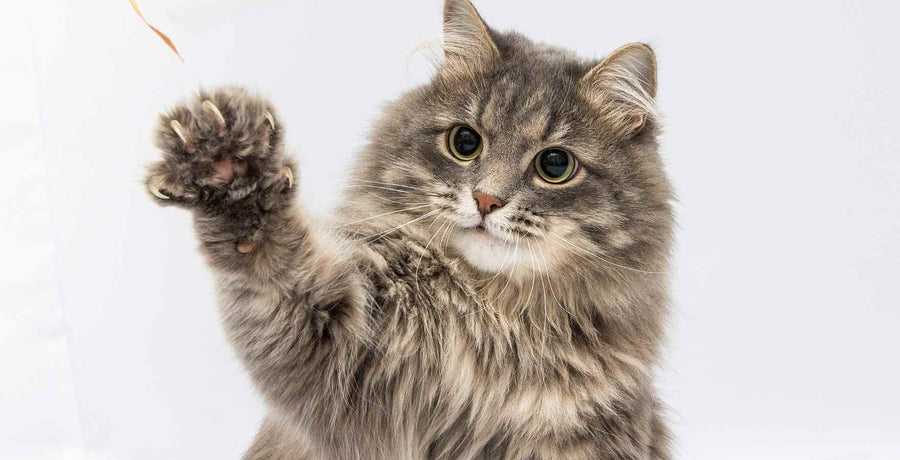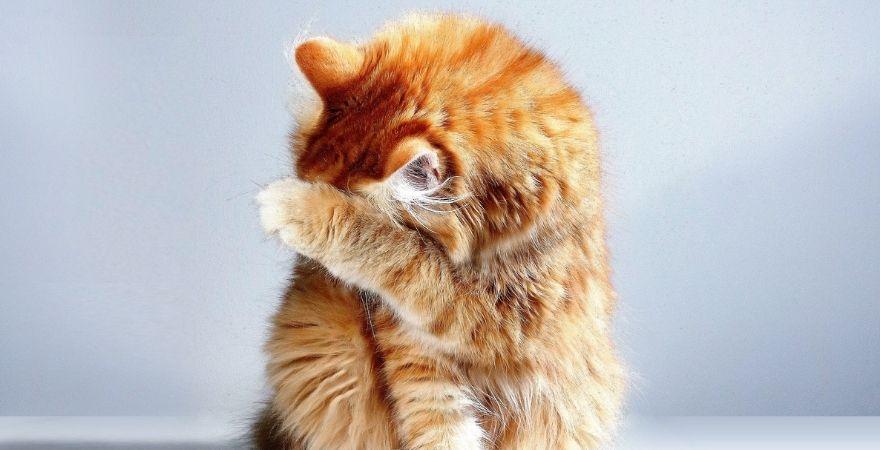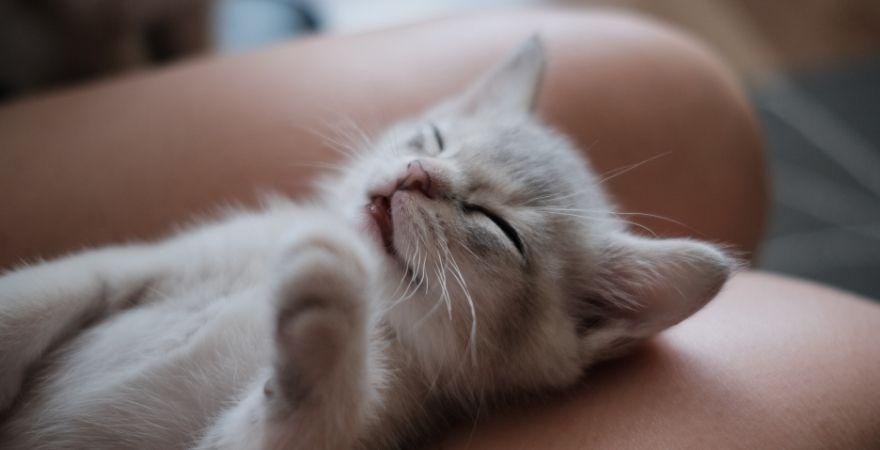
This may come as no surprise to you…
But Chronic Kidney Disease (CKD) is one of the most common conditions found in cats over time. In fact, stats show that 80% of cats over the age of 15 will have some type of kidney concern. With 1 in 3 developing CKD at some point in their lifetime.
This is why an early diagnosis of CKD can be life changing for your cat. Sadly, this is easier said than done.
Why? Because kidney disease is a ‘stealthy’ illness. It is extremely tough to notice until it’s in its advanced stages. You see, often cats won’t be visibly affected by CKD until their kidneys are severely damaged!
But worry not. We’ve compiled a list of the subtle behavioural & physiological cues that will help you catch this illness early on. So once you’ve finished this you’ll know EXACTLY what to look out for to keep your furball safe!
Ready... Great! Lets begin.
1. Loss of Weight

CKD prevents your kittys kidneys from fully flushing out all the waste products out of her body. And this is not good.
You see, not only does it cause them to feel ill, but also can cause weight loss. Noticing changes in your kitty's weight isn't easy, so we suggest weighing them at regular intervals and tracking their weight. If you do begin to notice a gradual weight change, speak to your vet.
2. Lack of Interest In Food Or A Reduce Appetite

The loss of important proteins and vitamins in your cats urine, along with the kidneys inability to fully flush out waste can make your cat lose his appetite.
Make sure to see if your cat is eating all his food. If they are consistently leaving their dinner uneaten, let your veterinarian know.
3. Increase in Urination

CKD prevents your cat from fully concentrating her urine. As a result they have to urinate a lot more than usual.
We suggest keeping an eye on her litter box. Is there more litter than usual clumping together? Is there blood in the stool? If so, speak to your vet.
4. Increase In Thirst

When your cat is urinates more, she will be drinking more water to compensate. If you notice your cat visiting that running tap a lot more often, being a little more playful with water, or generally being fascinated with different water sources it may be a sign of a larget issue.
5. Signs Of Dehydration Including: Dry Gums, Skin on Back Of Cats Neck Not Springing Back Rapidly After Being Lifted

With CKD, when your cat tries to drink more water to compensate for the excessive urination, it may not be enough. As a result your furbaby may become dehydrated. A method to check for dehydration is the ‘Skin Turgor Test’ – this is:
“Take a pinch of skin over the cat's shoulders and pull up gently, the skin should snap back into place when released. As the cat gets more dehydrated, the skin goes back in place more and more slowly. If the pinch of skin stays up (the "tent"), it is a sign of severe dehydration.”
6. Signs Of Lethargy And Appearing More Tired Than Usual

The inability of your cats kidneys to remove toxins and waste products from your furballs system will cause your fur babys to feel ill, resulting in lethargy and tiredness.
So keep an eye out for this and any changes in her behavior. For example, is she less sociable, maybe sleeping more? If so, contact your vet.
7. Vomiting and/or Constipation
If you notice this, please seek advice from your vet. The constipation is caused by the dehydration, and vomiting from the general sense of illness your furball is feeling.
8. Signs of Mouth Ulcers Developing, Which Can Lead To Bad Breath
Check your cats mouth regularly for inflamed gums or any ulcers. These are caused by the toxins in your cats body, which cannot be removed by the kidneys.
In Summary
If you notice any of these symptoms or changes in your cat make sure to book an appointment with your vet.
Because spotting any symptoms or changes in behaviour that are out of the ordinary for your cat can dramatically increase the chances of CKD being diagnosed at an earlier stage.
Your vet will perform several tests to diagnose the condition. If it is confirmed that your cat suffering from CKD they will work to find out which stage the condition is at.
We can’t state this enough... A prompt diagnosis of CKD will give you more options in managing your cats condition, and will help you give your fur baby a better quality of life altogether. But not only that, an early diagnosis will reduce the likelihood of your cat developing renal secondary hyperparathyroidism.
This is when the parathyroid glands enlarge and produce excessive amounts of parathyroid hormone (PTH). A complication that if left to go unnoticed, can reduce your cat’s long-term outlook.
Hopefully you’ve found our list pretty useful. As proud cat lovers ourselves, we want to make sure all cat parent have access to this vital information. Because a healthy cat means a happy home.
NOTE: Please always remember to speak with your cats vet if you have any questions of concerns regarding their health to provide you with peace of mind
ONE MORE THING...
If you really want to go that extra mile in keeping your cats kidneys healthy - check out the Scruffy Paws Kidney Vitalize chews.
These delicious chicken flavour chews are perfect for all cats (whether they have CKD or not), and the active ingredients inside them (Astragalus extract & Rhemannia extract) have been scientifically backed maintain good kidney health and fight inflammation(Click here to hear to the scientific backing of the product page)
And thats not all, take a look at what some of our customers have said about the Kidney Vitalize Chews:
“I am so happy to have found your Kidney-Vitalize Chews. My 15 year old cat Cagney was losing weight and had his blood tested. It showed he was in the beginning stages of kidney disease. My vet suggested changing his diet to a prescription kidney friendly one. I had also seen your product advertised on social media. I ordered a jar and Cagney loved it and it seems to have given him his appetite back.”
- Nancy H
“My cat bootsie seems to be doing better already! I think she has put on a little weight, more energy and hasnt had any problems urinating. I break up a chew and mix it in with her morning and afternoon feeding. Thank you so much for your product!. And Bootsie thanks you too!"
- Rita A
"I brought my Nicholas 18 years old to the vet today to have his creatine levels checked and they seem to have improved. I've had him on the chews for around a month. I'm totally thrilled with them"
- Anita S
We definitely suggest taking a look at the chews (click the button below to learn more!)






1 comment
Thank you for trying to get the word out about CKD! Hope this will help cats & their owners.